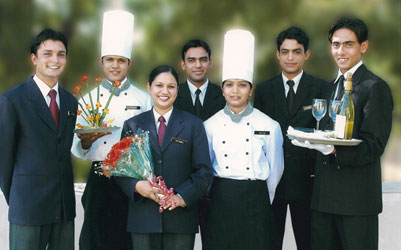A career in hotel management can be both rewarding and challenging, requiring a diverse set of skills to ensure success. Aspiring hotel managers must possess a unique blend of technical knowledge, interpersonal abilities, and strategic thinking to excel in the industry. This article explores the essential skills that every aspiring hotel manager should master, providing a roadmap for those looking to thrive in the dynamic world of hospitality.
Leadership and Team Management
A hotel manager is the captain of the ship, responsible for steering the entire team towards success. Effective leadership involves inspiring and motivating staff, fostering a positive work environment, and ensuring that everyone is working towards common goals. Strong team management skills are crucial, as they help in delegating tasks efficiently, resolving conflicts, and maintaining high levels of employee satisfaction and productivity.
Communication Skills
Clear and effective communication is at the heart of hotel management. Managers must be adept at conveying information to staff, guests, and stakeholders. This includes listening actively, providing constructive feedback, and addressing concerns promptly. Exceptional communication skills enhance guest experiences, streamline operations, and build strong relationships with employees and clients.
Financial Acumen
Understanding the financial aspects of hotel management is essential for maintaining profitability and sustainability. Aspiring hotel managers should be well-versed in budgeting, financial reporting, and cost control. They must be capable of analyzing financial statements, forecasting revenues, and identifying opportunities for cost savings. Strong financial acumen enables managers to make informed decisions that positively impact the hotel’s bottom line.
Customer Service Excellence
Delivering outstanding customer service is the cornerstone of a successful hotel. Aspiring hotel managers must prioritize guest satisfaction and strive to exceed expectations. This involves training staff to provide exceptional service, addressing guest complaints effectively, and continuously seeking feedback to improve services. Excellent customer service fosters loyalty, encourages repeat business, and enhances the hotel’s reputation.
Marketing and Sales
In a competitive industry, effective marketing and sales strategies are crucial for attracting and retaining guests. Hotel managers should have a solid understanding of digital marketing, social media, and traditional advertising methods. They must also be skilled in sales techniques, including upselling, cross-selling, and managing corporate accounts. A strategic approach to marketing and sales helps in maximizing occupancy rates and driving revenue growth.
Problem-Solving and Decision-Making
The hospitality industry is dynamic and often unpredictable, requiring managers to think on their feet and solve problems swiftly. Aspiring hotel managers should develop strong problem-solving and decision-making skills to handle unexpected situations, such as overbookings, maintenance issues, or guest complaints. Being able to assess situations, weigh options, and implement effective solutions is vital for maintaining smooth operations and ensuring guest satisfaction.
Time Management and Organization
Running a hotel involves juggling multiple tasks and responsibilities simultaneously. Effective time management and organizational skills are essential for prioritizing tasks, meeting deadlines, and ensuring that all aspects of hotel operations run smoothly. Aspiring hotel managers should develop strategies for efficient time management, such as setting clear goals, delegating tasks, and using tools like schedules and checklists.
Technology Proficiency
Technology plays a significant role in modern hotel management. From property management systems (PMS) to online booking platforms and guest feedback tools, aspiring hotel managers must be proficient in using various technologies. Staying updated with the latest technological trends and innovations in the hospitality industry can enhance operational efficiency, improve guest experiences, and provide a competitive edge.
Cultural Awareness and Sensitivity
Hotels often cater to guests from diverse backgrounds and cultures. Aspiring hotel managers should cultivate cultural awareness and sensitivity to provide inclusive and respectful service. This involves understanding different cultural norms, preferences, and expectations, and training staff to do the same. Cultural competence helps in creating a welcoming environment for all guests, fostering positive interactions, and enhancing the overall guest experience.
Educational and Professional Development
Continuous learning and professional development are key to staying competitive in the hospitality industry. Aspiring hotel managers should pursue relevant education and certifications, such as those offered by a Hotel Management College in Udaipur. Additionally, attending industry conferences, workshops, and seminars can provide valuable insights and networking opportunities. Staying informed about industry trends and best practices ensures that managers are well-equipped to lead their teams and drive the success of their hotels.
Interpersonal Skills
Building strong relationships with guests, staff, and industry partners is essential for successful hotel management. Interpersonal skills, such as empathy, patience, and diplomacy, help in fostering positive interactions and resolving conflicts amicably. Aspiring hotel managers should focus on developing these skills to create a harmonious work environment and deliver exceptional guest experiences.
Adaptability and Flexibility
The hospitality industry is constantly evolving, and hotel managers must be adaptable and flexible to keep up with changes. Whether it’s implementing new technologies, adjusting to market trends, or handling unforeseen challenges, the ability to adapt quickly and effectively is crucial. Aspiring hotel managers should embrace change, remain open to new ideas, and be willing to pivot strategies when necessary.
Aviation Management Skills
In addition to traditional hotel management skills, aspiring hotel managers can benefit from expertise in related fields, such as aviation management. This knowledge can be particularly valuable for hotels located near airports or serving a significant number of business travelers. A Aviation College in Udaipur can provide specialized training in areas such as airport operations, airline management, and customer service in the aviation industry. Understanding the unique needs of travelers can enhance guest experiences and drive business growth.
Conclusion
Mastering the essential skills outlined in this article can significantly enhance the career prospects of aspiring hotel managers. By focusing on leadership, communication, financial acumen, customer service, marketing, problem-solving, time management, technology, cultural awareness, and continuous education, future hotel managers can build a strong foundation for success. Embracing adaptability and exploring related fields, such as aviation management, can further broaden their skill set and provide a competitive edge. As the hospitality industry continues to evolve, well-rounded and skilled hotel managers will be crucial for driving innovation, delivering exceptional guest experiences, and ensuring the long-term success of their establishments.

